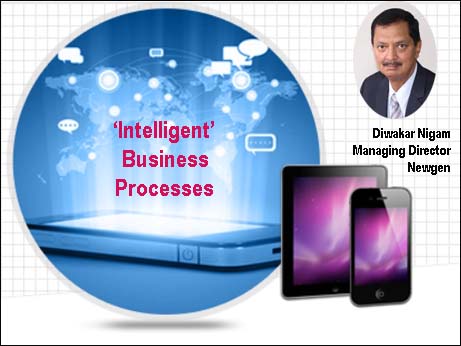
Integrate real time analytics with decision management technology into day-to-day ops
By Diwakar Nigam
Managing Director, Newgen Software
While the industry debates the relevance of the next-generation ‘intelligent’ business process management software (iBPMS), the market for traditional business process management software (BPMS) continues to grow steadily. To reap maximum benefits from a BPM solution, it should be mapped to the needs of specific usage scenarios.
iBPMS extends the scope of traditional BPMS by adding new capabilities, to support a new use case: Intelligent Business Operations (IBO). IBO is an approach that integrates real-time analytics and decision management technologies into the day-to-day operations of a business. However, iBPMS does not interfere with the capabilities of the traditional BPMS, which continues to cater to the needs of organizations looking at improving their overall business performance by streamlining mission-critical processes, and enabling continuous process improvement.
In this article apart from the new use case – IBO, which requires intelligent BPMS, I have covered two major usage scenarios of BPMS adoption, namely ‘BPMS as a Platform for Specific Process-Based Solutions’ and ‘BPMS as an Enabler for Continuous Process Improvement’.
BPMS as a Platform for Specific Process-Based Solutions
In this scenario the focus of the organization is on achieving key business results, typically improving business performance in specified areas – for example, improving compliance by adhering to SLA’s in a regulated industry like healthcare payers, achieving faster turn-around-time for customer on-boarding process in a bank or insurance firm, or improving agent productivity in a BPO. Another vital requirement is to improve business performance and gain process visibility through broader and better coordination of a mission-critical process. To facilitate this, a solution is needed, that can be quickly implemented and which integrates information, human efforts and automated tasks to achieve desired business results.
BPMS as an Enabler for Continuous Process Improvement
Here the key focus of the enterprise is to achieve Business Agility by using BPM as a platform for continuous process improvement, encompassing an ever-increasing set of organizational processes across various Lines of Business. The ability to rollout new processes quickly and change processes frequently in tune with market requirements is crucial, and is done by Business and IT in a collaborative manner. For example, in a bank, the business and IT collaborates through a BPM Center of Excellence to rapidly rollout processes across multiple lines of business and functions. BPM bridges the gap between business and IT, allowing them to collaborate on designing processes that are easy to change.
The Case for Intelligent BPMS
Enterprises today are facing unprecedented business pressures owing to globalization, increased competition, market consolidation, ever-changing regulatory norms, and demand for better customer service. The current conventional operations lack situational awareness; decisions are based on inflexible and hardcoded rules and policies and the processes are manual and rigid. The growing phenomena of social, mobile, cloud, and analytics are further fueling the dynamic environment.
The key to success in such an environment is continual adaption by being agile and proactive in responding to change. Enterprises need to leverage changing customer and market behavior, by having a better understanding of the evolving customer needs, to innovate with iterative and measurable improvements.
An Intelligent Business Process Management Suite provides enterprises a holistic approach for adaptability. The solution enables continuous process improvement by eliminating redundancy in operations, while increasing the efficiency and quality of products and services. The automation framework allows support for structured production workflows, as well as collaborative unstructured dynamic cases. Process intelligence integrates real-time analytics and decision management technologies into the day-to-day operations of a business.
What Makes Your Business Operations Intelligent?
Enterprises today, are increasingly realizing the importance of collaborating with key business stakeholders to achieve operational excellence and accelerate business innovation. While mobility is no longer an option, integration of social interactions with business operations has become a key success strategy. Business intelligence which traditionally used to be at an arm’s length with actual operational processes is now needed to provide both active, real-time analytics and predictive analytics using CEP & other statistical analytic tools.
Collaboration amongst the key stakeholders-business leaders, business analysts, process owners, business users, and IT, right from process designing to execution, and monitoring, to enable continuous process improvements, is the key to achieving operational excellence and accelerating business innovation.
Mobility: With the rise in penetration of mobile devices, shifting to mobility has become inevitable for any business, in order to sustain in an increasingly competitive business landscape. Incorporating mobility in their business process management strategy, enterprises can now be closer to their customers and also enable key stakeholders to collaborate on processes 24x7.
Support for Social Media Interactions: The pervasiveness of social media has made it an indispensable component of the business strategy of any intelligent business enterprise. It allows external stakeholders such as consumers and partners to participate in the creation and execution of services/products. Further, social media analytics data adds to the analytical capabilities of the business.
Extended Active & Predictive Analytic Capabilities: Expanding the scope of process analytics to encompass predictive analysis tools along with real-time Business Activity Monitoring (BAM), results in enhanced operational intelligence, improved process visibility, and better business responsiveness.
Complex Event Processing (CEP) enables real-time analysis of events. The most current streams of events are analyzed during runtime, to detect event patterns, allowing process stakeholders to assess the situation and respond appropriately to emerging threats and opportunities.
Newgen Software is a leading global provider of Business Process Management (BPM), Enterprise Content Management (ECM), Customer Communication Management (CCM), Document Management System (DMS), Workflow and Process Automation software products and solutions. It is a market leader in India and other emerging economies. In India, the company works with almost all the top banks, insurance companies, BPOs and several government organizations and PSUs.
March 11 2014